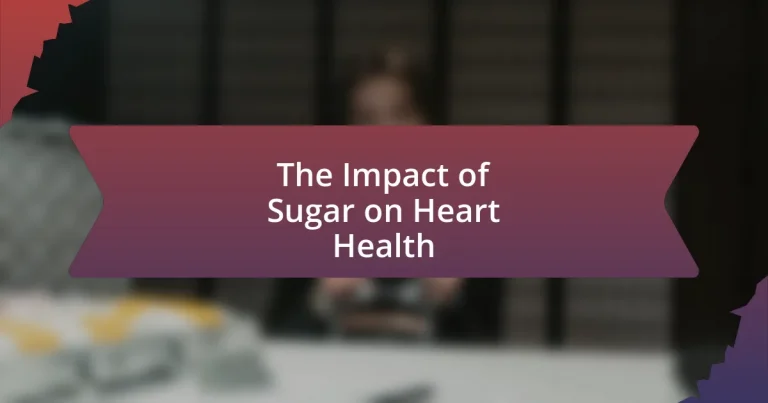The article examines the impact of sugar on heart health, highlighting how excessive sugar intake increases the risk of obesity, inflammation, and hypertension, all of which are significant risk factors for cardiovascular disease. It discusses the physiological mechanisms linking sugar consumption to heart issues, including its effects on triglyceride levels and cholesterol. The article also differentiates between natural and added sugars, emphasizing the harmful effects of added sugars found in processed foods and beverages. Recommendations for limiting sugar intake to protect heart health are provided, along with practical strategies for monitoring and reducing sugar consumption.

What is the Impact of Sugar on Heart Health?
Excessive sugar intake negatively impacts heart health by increasing the risk of obesity, inflammation, and high blood pressure. Studies indicate that high sugar consumption is linked to elevated triglyceride levels and lower levels of HDL cholesterol, both of which are risk factors for cardiovascular disease. For instance, research published in the Journal of the American College of Cardiology found that individuals consuming more than 25% of their daily calories from added sugars had a significantly higher risk of heart disease compared to those who consumed less than 10%. This evidence underscores the detrimental effects of sugar on cardiovascular health.
How does sugar consumption affect cardiovascular health?
Sugar consumption negatively affects cardiovascular health by increasing the risk of obesity, hypertension, and inflammation, which are all risk factors for heart disease. High intake of added sugars, particularly from sugary beverages, has been linked to elevated triglyceride levels and lower levels of high-density lipoprotein (HDL) cholesterol, both of which contribute to cardiovascular issues. A study published in the Journal of the American College of Cardiology found that individuals consuming more than 25% of their daily calories from added sugars had a significantly higher risk of dying from heart disease compared to those who consumed less than 10%. This evidence underscores the detrimental impact of excessive sugar intake on heart health.
What are the physiological mechanisms linking sugar to heart disease?
Excessive sugar intake contributes to heart disease through several physiological mechanisms, including increased inflammation, insulin resistance, and dyslipidemia. High sugar consumption leads to elevated levels of triglycerides and low-density lipoprotein (LDL) cholesterol, which are risk factors for atherosclerosis. Additionally, sugar can promote the formation of advanced glycation end products (AGEs), which can damage blood vessels and promote inflammation. Studies have shown that diets high in added sugars are associated with a higher risk of cardiovascular disease, as evidenced by research published in the Journal of the American College of Cardiology, which found that individuals consuming more than 25% of their daily calories from added sugars had a significantly increased risk of heart disease.
How does sugar influence blood pressure and cholesterol levels?
Sugar significantly influences blood pressure and cholesterol levels by promoting insulin resistance and inflammation. High sugar intake, particularly from added sugars and sugary beverages, has been linked to increased blood pressure due to its effect on weight gain and metabolic syndrome. A study published in the Journal of the American College of Cardiology found that individuals consuming high amounts of sugar-sweetened beverages had a higher risk of developing hypertension. Additionally, excessive sugar consumption can lead to elevated triglycerides and lower levels of high-density lipoprotein (HDL) cholesterol, which are risk factors for cardiovascular disease. The American Heart Association states that high sugar intake is associated with increased levels of low-density lipoprotein (LDL) cholesterol, further contributing to heart health issues.
Why is it important to understand sugar’s role in heart health?
Understanding sugar’s role in heart health is crucial because excessive sugar intake is linked to increased risks of heart disease. Research indicates that high sugar consumption can lead to obesity, inflammation, and elevated triglyceride levels, all of which are significant risk factors for cardiovascular issues. For instance, a study published in the Journal of the American College of Cardiology found that individuals consuming more than 25% of their daily calories from added sugars had a higher risk of dying from heart disease compared to those who consumed less than 10%. This evidence underscores the importance of monitoring sugar intake to maintain heart health and prevent related diseases.
What are the long-term consequences of high sugar intake on heart health?
High sugar intake has significant long-term consequences on heart health, including an increased risk of heart disease, hypertension, and obesity. Research indicates that excessive sugar consumption can lead to higher levels of triglycerides and LDL cholesterol, both of which are risk factors for cardiovascular disease. A study published in the Journal of the American Heart Association found that individuals consuming more than 25% of their daily calories from added sugars had a greater risk of dying from heart disease compared to those who consumed less than 10%. Additionally, high sugar intake is associated with insulin resistance, which can further contribute to heart-related issues.
How does sugar contribute to obesity and its relation to heart disease?
Sugar contributes to obesity by increasing caloric intake without providing nutritional benefits, leading to weight gain. High sugar consumption, particularly from added sugars in processed foods and beverages, is linked to increased fat accumulation, especially visceral fat, which is a risk factor for obesity. Research indicates that excessive sugar intake can lead to insulin resistance, a condition that promotes fat storage and weight gain.
Obesity, in turn, is a significant risk factor for heart disease. According to the American Heart Association, individuals with obesity are more likely to develop conditions such as hypertension, dyslipidemia, and type 2 diabetes, all of which are associated with an increased risk of cardiovascular disease. A study published in the Journal of the American College of Cardiology found that higher sugar-sweetened beverage consumption is associated with a greater risk of coronary heart disease. Thus, the relationship between sugar, obesity, and heart disease is well-established through various studies and health guidelines.

What types of sugars are most harmful to heart health?
Added sugars and refined carbohydrates are the types of sugars most harmful to heart health. These sugars, commonly found in sugary beverages, processed foods, and desserts, can lead to increased triglyceride levels, higher blood pressure, and inflammation, all of which are risk factors for cardiovascular disease. Research published in the Journal of the American College of Cardiology indicates that high intake of added sugars is associated with a greater risk of heart disease, highlighting the detrimental effects of these sugars on overall heart health.
What are the differences between natural and added sugars?
Natural sugars are those found inherently in whole foods, such as fruits, vegetables, and dairy products, while added sugars are those incorporated into foods during processing or preparation, such as sucrose or high-fructose corn syrup. Natural sugars come with vitamins, minerals, and fiber that contribute to overall health, whereas added sugars provide empty calories with little to no nutritional value, which can lead to health issues like obesity and heart disease. According to the American Heart Association, excessive intake of added sugars is linked to increased risk factors for heart disease, highlighting the importance of distinguishing between these two types of sugars for heart health.
How do added sugars impact heart health compared to natural sugars?
Added sugars negatively impact heart health more than natural sugars. Research indicates that high consumption of added sugars is linked to increased risks of heart disease, obesity, and hypertension. For instance, a study published in the Journal of the American College of Cardiology found that individuals consuming more than 25% of their daily calories from added sugars had a significantly higher risk of cardiovascular disease compared to those who consumed less than 10%. In contrast, natural sugars found in whole fruits and vegetables come with fiber, vitamins, and minerals that support heart health, making them less harmful when consumed in moderation.
What are common sources of added sugars in the diet?
Common sources of added sugars in the diet include sugary beverages, desserts, and processed foods. Sugary beverages such as sodas, energy drinks, and sweetened teas are significant contributors, often containing high fructose corn syrup or sucrose. Desserts like cakes, cookies, and ice creams typically have high levels of added sugars for flavor enhancement. Additionally, processed foods, including sauces, dressings, and breakfast cereals, frequently contain added sugars to improve taste and shelf life. According to the American Heart Association, excessive consumption of added sugars can lead to various health issues, including obesity and heart disease, highlighting the importance of monitoring these sources in the diet.
How do different types of sugar affect heart health differently?
Different types of sugar affect heart health in varying ways, primarily due to their metabolic pathways and impacts on inflammation and insulin sensitivity. For instance, added sugars, particularly fructose found in high-fructose corn syrup, have been linked to increased triglyceride levels and higher risks of heart disease, as evidenced by a study published in the Journal of the American College of Cardiology, which found that excessive fructose consumption can lead to metabolic syndrome. In contrast, naturally occurring sugars, such as those found in fruits, are accompanied by fiber, vitamins, and antioxidants, which can mitigate negative effects on heart health. Research from the American Heart Association indicates that whole fruits can lower blood pressure and improve cholesterol levels, demonstrating a protective effect against cardiovascular disease. Thus, the type of sugar consumed plays a crucial role in determining its impact on heart health.
What is the impact of fructose on cardiovascular health?
Fructose negatively impacts cardiovascular health by contributing to increased triglyceride levels and promoting insulin resistance. Research indicates that high fructose consumption is linked to a higher risk of developing metabolic syndrome, which is associated with cardiovascular diseases. A study published in the Journal of the American College of Cardiology found that excessive fructose intake can lead to elevated blood pressure and increased fat accumulation around the abdomen, both of which are risk factors for heart disease. Additionally, fructose is metabolized differently than glucose, leading to a greater likelihood of fat deposition in the liver, further exacerbating cardiovascular risks.
How does sucrose compare to glucose in terms of heart health risks?
Sucrose poses greater heart health risks compared to glucose. Research indicates that high sucrose intake is associated with increased triglyceride levels, which are a risk factor for cardiovascular disease. A study published in the Journal of the American College of Cardiology found that diets high in sucrose can lead to obesity and insulin resistance, both of which are linked to heart disease. In contrast, glucose, while still a sugar, does not have the same detrimental effects on triglycerides and metabolic health when consumed in moderation. Thus, the evidence suggests that sucrose is more harmful to heart health than glucose.

What are the recommendations for sugar intake to protect heart health?
To protect heart health, the American Heart Association recommends limiting added sugars to no more than 6% of total daily calories, which translates to about 100 calories (25 grams) per day for women and 150 calories (37.5 grams) per day for men. This recommendation is based on evidence linking high sugar intake to increased risks of heart disease, obesity, and hypertension. Studies have shown that excessive consumption of added sugars, particularly from sugary beverages, is associated with higher triglyceride levels and lower HDL cholesterol, both of which are risk factors for cardiovascular disease.
How much sugar is considered safe for heart health?
The American Heart Association recommends that women limit added sugar intake to no more than 6 teaspoons (25 grams) per day and men to no more than 9 teaspoons (38 grams) per day for optimal heart health. Excessive sugar consumption is linked to increased risks of heart disease, obesity, and high blood pressure, as supported by research published in the Journal of the American College of Cardiology, which found that higher sugar intake correlates with a greater risk of cardiovascular disease.
What guidelines do health organizations provide regarding sugar consumption?
Health organizations recommend limiting added sugars to reduce health risks. The American Heart Association advises that women should consume no more than 6 teaspoons (25 grams) of added sugar per day, while men should limit their intake to 9 teaspoons (38 grams) per day. The World Health Organization suggests that added sugars should make up less than 10% of total daily energy intake, with further benefits observed if reduced to below 5%. These guidelines are based on evidence linking high sugar consumption to obesity, type 2 diabetes, and cardiovascular diseases, highlighting the importance of moderation in sugar intake for maintaining heart health.
How can individuals monitor their sugar intake effectively?
Individuals can monitor their sugar intake effectively by tracking their daily consumption through food diaries or mobile apps designed for nutritional tracking. These tools allow users to log the foods they eat, providing detailed information on sugar content, which helps in maintaining awareness of their intake levels. Research indicates that keeping a food diary can lead to a significant reduction in sugar consumption, as individuals become more conscious of their dietary choices. For instance, a study published in the American Journal of Preventive Medicine found that participants who tracked their food intake lost more weight and reduced their sugar intake compared to those who did not.
What practical steps can be taken to reduce sugar intake?
To reduce sugar intake, individuals can implement several practical steps. First, they should read food labels carefully to identify added sugars, as many processed foods contain high levels of sugar. Research indicates that the average American consumes about 17 teaspoons of added sugar daily, exceeding the recommended limit of 6 teaspoons for women and 9 teaspoons for men, according to the American Heart Association.
Second, individuals can opt for whole foods such as fruits, vegetables, whole grains, and lean proteins, which naturally contain less sugar compared to processed alternatives. Third, replacing sugary beverages with water, herbal teas, or unsweetened drinks can significantly lower sugar consumption; sugary drinks are a major source of added sugars, contributing to obesity and heart disease.
Additionally, cooking at home allows for better control over ingredients, enabling individuals to limit sugar in recipes. Lastly, gradually reducing sugar in recipes and beverages can help adjust taste preferences over time, making it easier to maintain lower sugar intake.
What are some strategies for cutting back on added sugars in the diet?
To cut back on added sugars in the diet, individuals should focus on reading food labels, choosing whole foods, and reducing sugary beverages. Reading food labels helps identify hidden sugars in processed foods, as many products contain added sugars even when they are not sweet. Choosing whole foods, such as fruits, vegetables, whole grains, and lean proteins, minimizes the intake of added sugars, as these foods typically contain natural sugars and are more nutrient-dense. Reducing sugary beverages, which are a significant source of added sugars, can lead to a substantial decrease in overall sugar consumption; for instance, a single 12-ounce can of soda contains about 39 grams of sugar, which exceeds the American Heart Association’s recommended daily limit for added sugars.
How can meal planning help in reducing sugar consumption?
Meal planning can significantly reduce sugar consumption by allowing individuals to prepare balanced meals in advance, which minimizes the likelihood of impulsive, high-sugar food choices. By organizing meals that emphasize whole foods, such as fruits, vegetables, lean proteins, and whole grains, individuals can effectively limit their intake of added sugars found in processed foods. Research indicates that meal planning is associated with healthier eating patterns, as it encourages the selection of nutrient-dense foods and reduces reliance on convenience foods that often contain high levels of sugar. A study published in the Journal of Nutrition Education and Behavior found that individuals who engage in meal planning are more likely to meet dietary guidelines, including lower sugar intake, thereby supporting better heart health outcomes.
What are the signs of sugar-related heart health issues?
Signs of sugar-related heart health issues include increased blood pressure, elevated triglyceride levels, and the presence of abdominal obesity. These indicators are linked to excessive sugar consumption, which can lead to insulin resistance and inflammation, both of which are risk factors for cardiovascular disease. Research published in the Journal of the American College of Cardiology indicates that high sugar intake is associated with a higher risk of heart disease, highlighting the importance of monitoring sugar consumption for maintaining heart health.
What symptoms should prompt a discussion about sugar intake with a healthcare provider?
Symptoms that should prompt a discussion about sugar intake with a healthcare provider include frequent fatigue, unexplained weight gain, increased thirst, and frequent urination. These symptoms can indicate potential issues such as insulin resistance or diabetes, which are linked to high sugar consumption. Research shows that excessive sugar intake can lead to metabolic syndrome, characterized by these symptoms, and increases the risk of heart disease. Therefore, experiencing these symptoms warrants a conversation with a healthcare provider to assess sugar intake and overall health.
How can regular check-ups help in monitoring heart health related to sugar consumption?
Regular check-ups can significantly aid in monitoring heart health related to sugar consumption by providing healthcare professionals with the opportunity to assess key indicators such as blood pressure, cholesterol levels, and blood glucose levels. These indicators are crucial because excessive sugar intake is linked to increased risks of heart disease, obesity, and diabetes. For instance, a study published in the Journal of the American College of Cardiology found that high sugar consumption is associated with a higher risk of cardiovascular disease. Regular check-ups allow for early detection of any adverse changes in these health markers, enabling timely interventions and lifestyle modifications to mitigate risks associated with high sugar intake.





